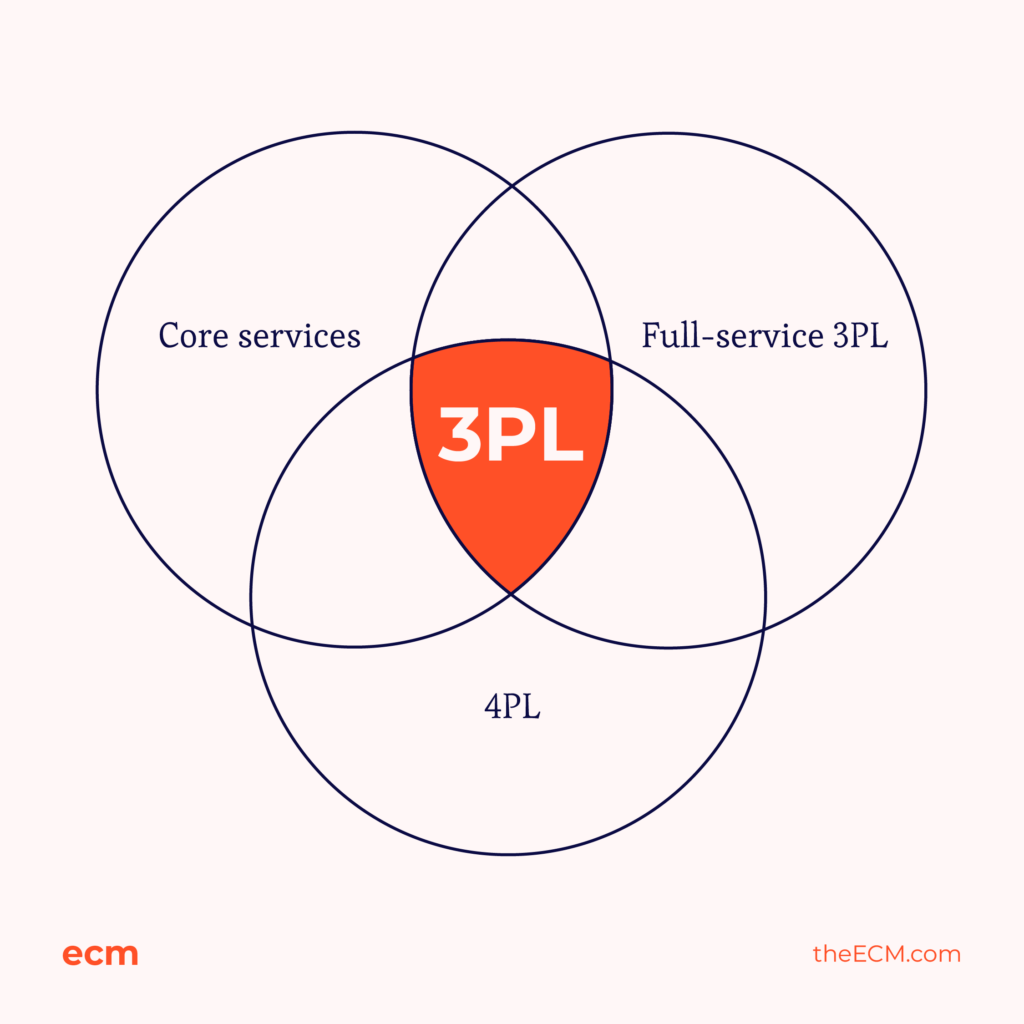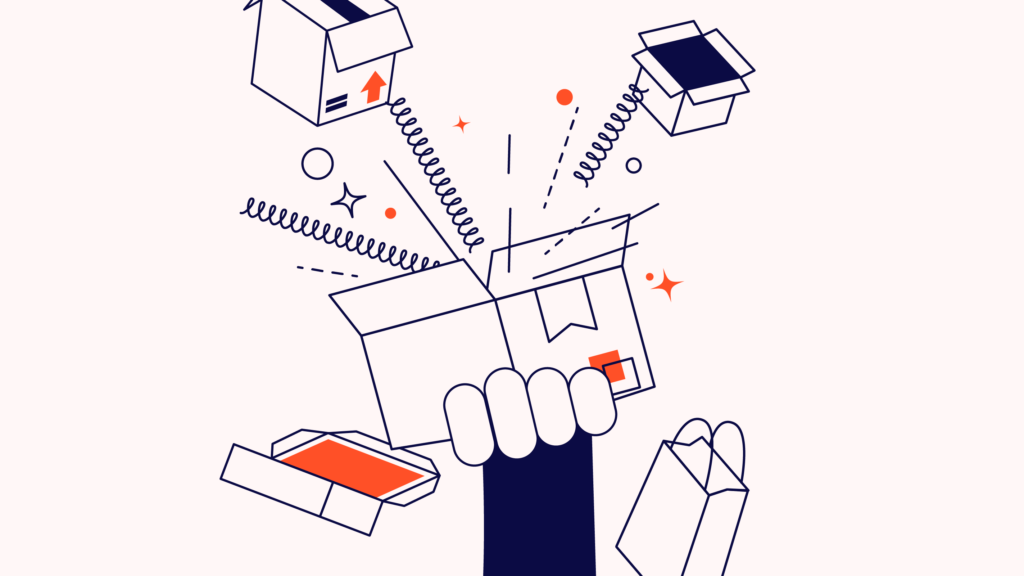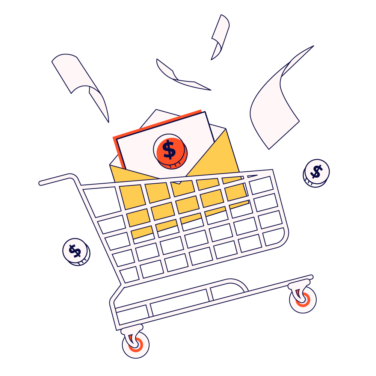For most ecommerce companies, warehousing and logistics are the first big expenditures when the brand is looking to grow, as they outgrow shipping all the orders themselves. Over the last few years, the 3PL industry has grown to nearly $1.9 trillion to keep pace with the growing ecommerce sector and shows no signs of slowing down.
Yet most retailers and ecommerce stores don’t take advantage of all the features and benefits of a 3PL.
In this guide, I’ll detail how to use a 3PL partner for ecommerce fulfillment, with the pros and cons, plus some practical tips for integrating 3PL fulfillment into your order management system.
What Is A 3PL
3PL stands for Third Party Logistics, and it refers to using a third-party company to handle your logistics in your business. Most commonly, a third-party logistics provider will refer to a warehouse or fulfillment center and all the handling, storage, picking and packing, and everything else a warehouse manages. But the term 3PL can also refer to other outsourcing partners, such as shipping companies.
Some 3PLs are huge brands that offer end-to-end services, including storage, fulfillment services, returns, quality inspections, and nearly every aspect of logistics. While some 3PL companies are smaller and offer only a few services, most 3PLs can integrate with your order management system and inventory management software so that you can integrate them into your business very easily.
Pros Of A 3PL
Expertise
3PL companies are experts at logistics and fulfillment processes and usually have long-established relationships with other companies in the logistics chain.
Time and cost saving
Shipping and logistics make up most of the man-hours for ecommerce brands, costing time and money. While you need to pay for 3PL services, in the long run, you may find you are saving money and being more cost-effective.
Scalability
You don’t want to be spending your time working on shipping when you could be concentrating on growing your business with new product development, marketing efforts, or sales.
Improved customer experience
3PLs can offer excellent services to customers, including services such as next-day shipping, handling returns, and even customer service. Oftentimes, 3PL providers can offer these services better than you can, which is great for customer satisfaction.
Integrated systems
3PLs can integrate their warehouse management system (WMS) into your enterprise resource planning (ERP), order management system (OMS), or inventory management system (IMS). This will give you and your team great visibility of your inventory.
Cons Of A 3PL
Costs
While a 3PL may save you money in the long run, there will be some time and money needed to get set up. However, there can be just as much cost and hard work needed if you run your logistics in-house.
Less control
When you use a 3PL, you usually need to use the systems in place, which may lead to more training for your team. Also, unless the 3PL can integrate into your systems, you may lose some visibility of things like stock levels.
Complicated pricing and costs
Some 3PLs have very complicated cost structures. The last 3PL I worked with to handle my Amazon FBA overflow stock had charges for inbound shipments, outbound shipments, storage per square foot, palleting charges, repackaging charges, and additional costs for heavy weights, among others. It became far too much for me, so I decided to move to a different 3PL, which was very time-consuming.
Different Services Offered By 3PLs

3PLs can offer a lot of services depending on what kind of ecommerce business you are, what your budget is, and what your business needs are.
There are some key core services that nearly all 3PLs offer, and then some additional optional services.
Core services (most common services provided by 3PLs)
- Freight and shipping management: All 3PL warehouses will accept incoming freight shipments in boxes or on pallets. The best 3PLs will even liaise directly with your manufacturer of freight forwarders to plan restocking. They should also be able to manage service providers such as shipping companies. You may offer customers different shipping options and shipping times, such as next-day delivery, and a good 3PL should be able to handle these.
- Warehousing: Storing and managing inventory in distribution centers or warehouses is the main function of a 3PL. If you have stock that has a particular need, for example, frozen, expirable, or fragile goods, these can also be sent to a 3PL, but you should check that the 3PL has the facilities and warehouse space.
- Ecommerce order fulfillment: Order processing, picking, packing, and shipping products to customers are the main parts of the order fulfillment process. Most 3PLs will integrate with your order management system so that orders can be sent directly to the 3PL without you needing to do any work. If you use an ecommerce platform such as Shopify, there are plug-ins you can use to fulfill orders automatically, and some of the larger 3PLs like ShipHero have their own Shopify plugins.
- Inventory management: A 3PL should monitor and track your inventory and synchronize the real-time data with your inventory management system. 3PLs should also give you statistics about your stock, such as best sellers, low stock alerts, and slow-moving stock. this will help you with order volume forecasting, especially around busy times of the year.
- Picking, packing, and labeling: If you are using a 3PL for customer shipments as well as general storage, then you will need the warehouse to manage the picking, packing, and labeling. You may need different packaging and shipping labels for different sales channels. For example, Amazon FBA has very specific labeling requirements.
- Return management (reverse logistics): If your 3PL is handling customer shipments, then they may also need to handle returns. This is a part of 3PL that many ecommerce business owners don’t want to talk about, but returns are inevitable. When you get a return, you also need to think about how to handle the product and the customer. If the stock is going back onto the shelf, it needs to be checked over first. If the product is being disposed of, then the 3PL must also be able to destroy or recycle the products correctly.
Additional services (extra services offered by some 3PLs)
- Quality inspection (QI): QI is when products are checked for faults, either when returned or as part of the manufacturing process. QI ensures your products are good quality and consistent.
- FBA prep: Amazon FBA has very specific package requirements so that some 3PLs can prepare the products to Amazon’s standards.
- Amazon Prime deliveries: If you use a service called Seller Fulfilled Prime, your customer orders from Amazon can be delivered by your 3PL as long as they can keep up with Amazon’s shipping and returns policy. It can be cheaper than using FBA, especially if your products are in the oversized category. Still, Amazon will penalize you if your shipping performance drops below a certain level, and Amazon is very strict on this!
- Multi-channel fulfillment: If you sell your products through multiple channels such as marketplaces, DTC, and wholesale, you might need different packaging and storage options for your stock but one consolidated view of all the inventory in the warehouse.
- Freight and transportation: If you are manufacturing in China or India and getting products shipped to the U.S., UK, Europe, or wherever your customers are, some 3PLs can be your freight forwarder and even handle customs and taxes.
- Multiple locations: The largest 3PLs have warehouses in multiple locations to help you with faster shipments to your customers or by helping reduce international shipping costs.
- Other services: Assembly of products, kitting or bundling, consulting, packaging design.
Full-service 3PL
Some 3PLs offer an entire range of logistics services, so you can have end-to-end supply chain management all in one place. These 3PLs are usually the bigger ones that can handle local and international shipments and will integrate with more or less any system.
4PL (Fourth Party Logistics)
4PL is a new term in logistics operations management, and it involves the fulfillment provider taking a more strategic or integrated role within your business. Often it will involve sharing staffing or having staff responsible only for your business. Not only will 4PL partners manage your logistics, but they will also act as operational managers within your organization, helping you to improve your overall logistics strategy.
How To Choose A 3PL
When you start looking for a 3PL, you might be completely overwhelmed by the many options you have. We put together this list of some of my favorite 3PLs, but before you rush into making a decision, there are a few factors that you should think about.
It is important to understand your requirements, as changing 3PL is time-consuming and expensive. I had to change 3PL mid-way through the pandemic, and it took over a month for it to be sorted, which was time I should have been spending on marketing.
These are some of the questions you should think about.
What are your requirements?
The reason you need a 3PL should be obvious because if you have already started looking for one, the chances are you know what you need. However, you need to decide if you need core services such as warehousing or if you need a 3PL to manage your order fulfillment too.
You should also consider whether you need international or just local shipments. If you are shipping internationally, then you will need a 3PL that can handle different labeling or packaging for international shipments.
Are you delivering products to Amazon FBA? If so, you will need to work with a 3PL that understands the strict requirements of an Amazon shipment.
Do your products have specific storage requirements, such as freezing temperatures? If so, you must ensure your warehouse can accommodate your products.
What is your budget?
Some 3PLs are basic warehouses that store your products, whereas some are huge fulfillment operations that handle everything, including returns, software integration, and freight management.
These forwarders are more expensive but may save you money in the long run. However, most will grow with you, which means you can expand which services you use as your business grows.
Another thing to consider with your budget is the cost structure. Some 3PLs have complicated payment structures, making it hard to budget. The best thing to do is to get the 3PL to give you an example of the cost breakdown for one of your existing boxes.
What software integrations are there?
Different 3PLs have different ways of working. The first 3PL I worked with only used to email me with my stock levels, which worked for a bit, but I quickly outgrew it.
An inventory management system keeps track of all your stock in one place, which is extremely important if you want to grow your business. Most 3PLs will integrate with the biggest inventory management software, giving you a good view of your stock levels.
If you want the 3PL to process orders, too, you will need the 3PL to integrate with your order management system. The reason for this is you don’t want to be manually pushing orders to your warehouse so they can be sent to the customer. You want the order to go to the warehouse, where it can be picked, packed, and sent. You also want the inventory levels updated immediately, so customers can see whether an item is in stock.
What is the reputation of the 3PL?
Before you choose a 3PL, try to get on a call with them so you can speak to your potential account manager to see how they work. It is important to have a 3PL that is communicative and you understand how they work.
Take some time to look at their capabilities, expertise, and reputation. Look for critical reviews and testimonials from other ecommerce businesses who have worked with them. This will let you see what service they provide and their ability to meet your requirements.
Take Your Fulfillment Farther With A 3PL Partner
A 3PL is a big investment in your business, so it is important to understand your requirements and work with a 3PL that can deliver on those requirements.
Get on the phone and speak to your potential account manager, ask them how they operate, and work out if they will be a good fit for you.
For more tips and insights about 3PLs, fulfillment services, and all your logistics operations for ecommerce, subscribe to The Ecomm Manager newsletter today.
More great ECM content:
- What Is 3PL (Third-Party Logistics): Definition & Top Companies to Use
- A Guide To The Global Order Fulfillment Process
- Ecommerce Warehouse Process Guide: Expert Tips & Advice for Success
- How To Optimize The Ecommerce Order Fulfillment Process: 8 Easy Tactics
- Ecommerce Returns Best Practices: How To Handle & Solutions (Guide)
ECM recommends:


